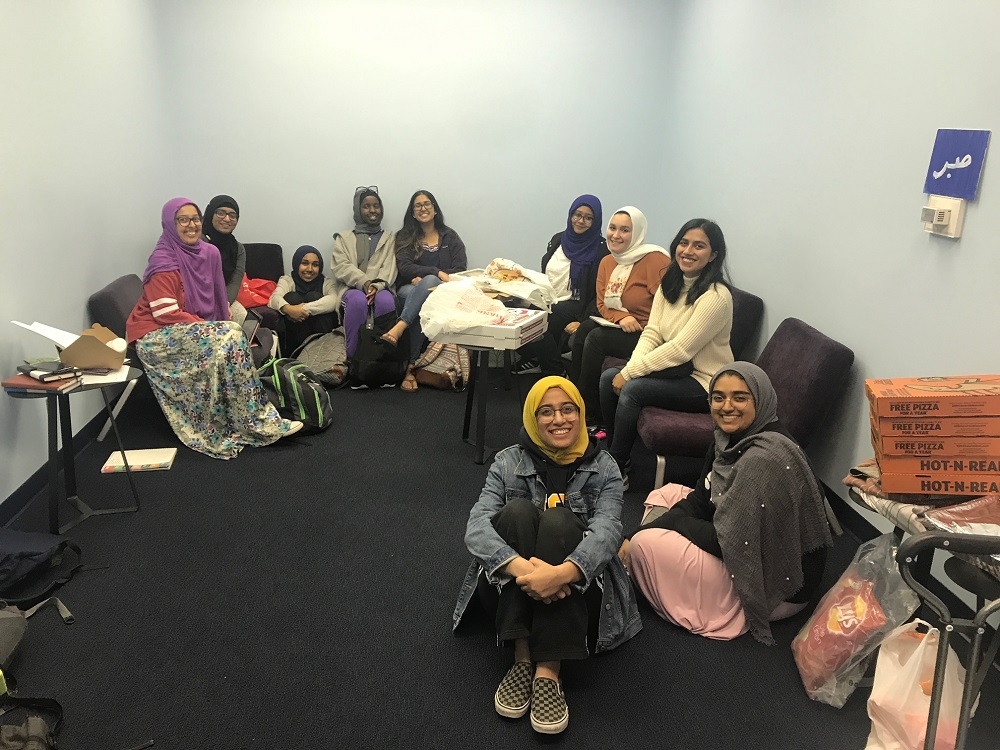17 Tips on How to Make the Most of A Ramadan in College
Faith
|
Mar 28, 2022
|
11 MIN READ

Image source: Californianstogether.org
By Khadija Ahmed
For those of us who are in our early 20s and younger, we’ve grown up with most of our Ramadan fasting experiences having occurred sometime during the summer (and not while we were in school. But as Ramadan follows a lunar calendar that shifts 10 days back yearly, Ramadan now squarely fall during the college and school year. And for many college students, the pressures of courses, internships and the ongoing crisis of early adulthood brings a set of unique challenges to the blessings of this holy month.
When living away from home as a freshman in college in California, “doing” Ramadan on my own without my family was daunting. Not only were they my emotional support throughout the month, but the struggle of having to take care of myself during a time that is guaranteed to have delicious home-cooked meals at the end of fasting was one hard pill to swallow. On top of that, I was spending full days on campus, my back-to-back courses providing no relief.
Mentally I was prepared for a long and tough Ramadan that year. But boy was I wrong! Instead, I was pleasantly surprised to enjoy my time on campus. These experiences I had as a freshman helped carry me through the next two years of Ramadan and college impacted by COVID.
So, as I plan out my last Ramadan as an undergraduate student, here are some tips I have followed to help me – and hopefully you – make the most of this auspicious month.
Suhoor Time
1. Make instant or prepare overnight meals: It’s a simple tip, an obvious one even, but it was one of the first lessons I had to learn living away from home. Especially if you're like me and can barely open your eyes let alone get your suhoor ready, preparing meals beforehand can be extremely helpful. It is as easy as taking note of what you have on hand the night before, so you don't scramble to find your cereal or a protein bar under your bed (long story).

Boiled eggs on avocado and toast; image source: Nicola Barts on Pexels.
Here are some of my go-to meals and food items for suhoor in a dorm or college apartment:
- Overnight oats: 1/4 cup oats, 1/4 cup milk and one tablespoon of maple syrup, mixed and chilled for 5+ hours
- Nutella/nut butters: I put this on everything from pancakes to pita bread. You can cut an apple and dip it in a nut butter to eat as well! My personal favorite is Nutella (chocolate, duh), but any nut butter will provide that extra protein you need to get you through the day.
- Smoothies: I pre-blend assorted frozen fruit along with bananas, plant based milk, and any sweetener the night before for a quick energy packed drink. You can even add protein powder to make it more filling. Admittedly this may be harder to do if you’re in the dorms, but you could do it the night before if there is a blender handy.
- Hash browns and avocado: If you prefer something savory in the morning, frozen hash browns paired with sliced avocado is a great way to start your suhoor. Warm up the hash brown in the toaster oven or stove, top with slices of avocado and sprinkle everything bagel seasoning.
- Cereal: My personal favorite, mostly because it only requires two ingredients and can be made especially when you wake up with only five minutes on the clock or if you’re living in one of those cellblock dorm rooms. A healthy, big bowl has easily gotten me through the day. If you’re a protein bar lover, work that into your suhoor as well.
- Dates: We usually associate dates with breaking our fast, but I love having dates during suhoor as a way to ensure I have something that will provide me energy throughout the day. Keep a box in your room, and eat one or two to top off your suhoor.
2. Room service and meal plans: If you're staying in the dorms, you may be in luck! Many dorms and meal plans offer students suhoor. Reach out to your dining hall to see if they have an option for picking up breakfast the night before or if they deliver directly to your dorm room. At my cousin’s college on the east coast, her dining program is giving “suhoor kits” to the Muslim students.
You can also pick up an extra meal from your dining hall the night before and heat it up for suhoor. A heads up – many meals offered for suhoor may not be filling or have much variety, so keep in mind tip #1.
3. Give a heads up: If you share a room/residence with someone who does not observe Ramadan (either a non-Muslim or someone non-practicing), make sure to give them a heads up. Especially for suhoor time, let them know that you will be waking up early to eat your pre-fast meal. A conversation about suhoor can also provide the opportunity to take into consideration any requests they may have.
For example, if they wake up easily, try to plan your meals beforehand and eat in a common area. Usually, there shouldn’t be any problems, but having a conversation beforehand helps alleviate any surprises down the road, especially when it comes to your alarm clock going off in the early hours of the morning!

Image source: Monstera on Pexels
1. Schedule classes accordingly: If you're on either the semester or quarter system at your university/community college, it may be a little late to change your course schedule. So keep this in mind for next year when you are signing up for classes: Try to plan your courses to end before iftar time. Having your evening open allows for you to complete class work and study, but also allows some time to break your fast intentionally.
You can also do the reverse, where you schedule your classes to start after iftar, opening up your morning to extra sleep, study and ibadah (worship).
2. All nighters: This tip is for my night owls with classes later in the day. If your schedule allows it, consider staying up a few days out of the week to catch up on course work/study. This allows you to use your post-iftar energy and ensure you don’t miss suhoor. After suhoor, you can go ahead and get 6-8 hours of sleep and start your day. This tip is especially helpful before an exam or final!
Planning for Iftar
1. Talk to your professors: If you find yourself having iftar smack in the middle of class, this tip is for you. If you already have your schedule on hand and see that a class overlaps with iftar, reach out to your professor ASAP. Professors are required to attend to your needs, so many will allow you to leave your lecture/discussion/seminar to break your fast and pray.
Keep some dates, water and snacks with you accordingly so you can break your fast when the time comes. It helps to carry a travel prayer mat so you can step out of class momentarily and pray conveniently. (Scope out where you can pray ahead of Ramadan starting.)
This tip also applies to Eid, so make sure to reach out to your professor so you don't find yourself with two midterms during Eid day (true story).

The author (in the yellow hijab) and her friends on their college campus in Ramadan.
2. The Masjid: For many of us, the masjid is a centerpiece to our Ramadan evenings. My family rushes to join isha prayer after iftar at home, or often we break our fast with our masjid community. You don’t necessarily have to lose your masjid connection when you’re in college.
Fortunately, many universities have either a masjid (or at least a prayer room or religions/faith center) on campus or a masjid nearby. Many masjids even provide free iftar and dinner, a blessing I took full advantage of during my freshman year. If your schedule allows for you to visit a masjid close to you, make sure you think about how you’re going to get there and back (transportation) during Ramadan.
The masjid can provide a feeling of family and togetherness that many students who live on campus may miss during this month. Check where your nearest masjid is located before Ramadan begins, and see if you can get out there at least a few times!
3. Water and dates: This tip is pretty self explanatory, but make sure to carry water and dates, even if you plan on breaking your fast off campus. Plans change, and because we tend to not bring water or food because we are fasting, you may find yourself without a way to break your fast.
Ibadah and College Life
1. An ayah at a time: It’s easy to find ourselves comparing ourselves to others, especially when it comes to how much worship or Quran reading we are doing during Ramadan. As college students our courses, internships, jobs, and family obligations may make it seem difficult to get our Quran recitation, extra du’a or extra salah in. One tip that I was taught by an upperclassman was to take it one ayah at a time – literally.
Sometimes the ability for us to be consistent and intentional in ibadah is what makes the action more meaningful. Yes, it is amazing to be able to finish the holy Quran during the month when it was revealed. But even completing a surah or a juz or two when we are able is also an accomplishment and especially better than not being able to at all. Your intentions and dedication to whatever kind of and amount of worship you can do with your academic load will, Insha’Allah be rewarded by a merciful Allah (S).

Image source: Pexels
2. Make intentions everywhere: This tip I learned from our amazing on-campus chaplain, and it has been a lesson I practice outside of Ramadan as well. Set your intention for every task – be it studying, cooking, walking to class, meeting with friends – as an act of worship. No matter what we are doing in our daily lives, there is always a way to connect it back to Allah (S).
For example, before studying for your class, set the intention that you are studying at this moment in order to expand your knowledge for the sake of Allah (S), for Allah (S) loves those who increase themselves in knowledge. This allows you to practice ibadah in your everyday actions without feeling like you are missing out by doing them.
3. If you’re feeling overwhelmed, keep your goals simple: Maybe this Ramadan will be about praying all five of your salah on time and adding the sunnah prayers to it. Maybe it’s about listening to audio Quran in addition to reading an ayah a day. Maybe it’s about giving yourself 15 minutes at iftar time to intentionally make du’a. Maybe it’s about getting up 10 minutes earlier and getting two rakats of tahajjud prayer. Make just a few, simpler goals and stick to that. Consistency always made me feel like I availed at least some blessings of the holy month.
4. The MSA: This is a little shout out to my own Muslim Student Association, but many universities have MSA’s that offer special events for Ramadan. Whether it’s having halaqas (religious study circles), inviting special speaker, even hosting overnight qiyams (nighttime worship sessions), reach out to your MSA if you haven't already to take advantage of these events or to plan these events!
5. Replace old habits: This is another easy way to incorporate ibadah into your daily activities. Sometimes we find ourselves leaning towards old habits during Ramadan that can easily be substituted with something more productive. Personally, my own weakness is watching K-dramas (Korean dramas) whenever I have free time (especially to unwind after a long day). My favorite trick is to instead try to watch an Islamic lecture on YouTube.
This can be done for books, music even when socializing with friends. Try to spin your actions to be Islamically productive!
General thoughts

1. Find support: Ramadan is inherently community-centered, either at the mosque or with your family. For students, both on and off campus, you may feel that you are missing the comforting and special aspect of this month when you find yourself on campus all day. My first Ramadan on campus, I found extreme comfort in my MSA and in my roommates, who were also Muslim.
Being able to break my fast, pray, or just interact with other Muslims helped make the days feel less lonely. Find a friend, a classmate, roommate, dorm neighbor or an MSA member who you can reach out to so you don’t feel like you are going through this month alone. They don’t have to be Muslim either; plenty of us are blessed with having non-Muslim friends who are supportive of our efforts in Ramadan and may join us when we have iftar. Just the act of breaking your fast with someone you trust can help remove the feeling of isolation.
2. Go online for support: As much as we want, sometimes we can’t find that in-person support or community we need as a college student. Maybe your college has a small Muslim population or is in a location where there aren’t many Muslims or a masjid nearby. That’s hard. Period. But think about what we did in COVID times and cultivate touchpoints online. There are beautiful lectures we can listen to in segments daily, or even virtual iftars where we can connect with Muslims to break our fast together.
3. Extra points: As mentioned before, many aspects of Ramadan – be it fasting while going to class, reading the Quran or doing extra prayers – may seem too overwhelming to complete. However, remember that Allah (S) rewards you based on the difficulty of the task you are completing. That extra ayah that you complete, that extra sujood you push yourself to do will amount to more reward than for those who do not struggle to do so.
And always remember to make the intention to do more! Allah (S) will reward you for your intention, even if you were unable to fulfill it, for He is the most rewarding and the most merciful.
4. Pour your heart out in du’a: Last but not least, make du’a for yourself. Ramadan is a month of growth and reflection, and we should all strive to make the most of it. The best way to ensure that is as easy as asking Allah (S) for it. Especially when we hit that mid-Ramadan slump, our du’as and intentions can push us to gain the most benefit this year.
I pray that Allah (S) allows us all to make the most of this blessed month, to make it easy on us and to reward us for our struggles and our victories. I wish you all, especially the students out there, a Happy Ramadan!
What are your tips for getting the most out of Ramadan while in college? What are your favorite suggestions from this list? Share with us in the comments below!
Khadija Ahmed is a senior college student in Southern California who is graduating this year.
Subscribe to be the first to know about new product releases, styling ideas and more.
What products are you interested in?

